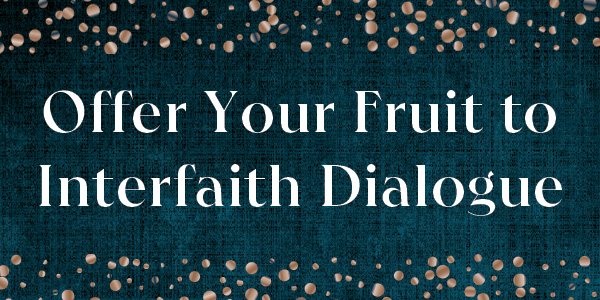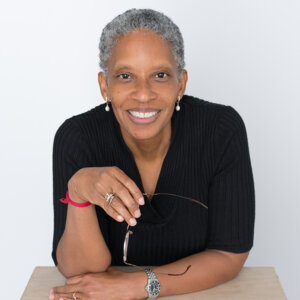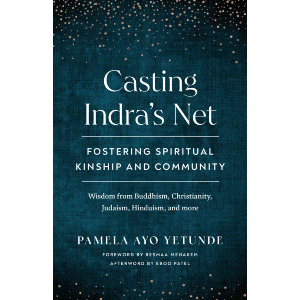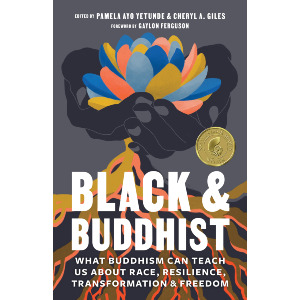
Reflections from Pamela Ayo Yetunde, author of Casting Indra’s Net
For all the wonderful things people think Buddhism is about, I believe Buddhist practitioners remain under-resourced when it comes to interfaith (and by this I also mean interreligious) leadership and dialogue.
Many things are said about Buddhism: it’s a world religion, it’s a way of life, it’s a philosophy, it’s a set of practices, it’s a set of ethics and it’s a psychology. People say it’s about mindfulness, meditation, chanting, and compassion. I agree with all these perspectives, and I’d like to add one more—Buddhism is about interfaith dialogue. Even though many non-Buddhists read Pema Chödrön, even though the Dalai Lama publicly engages in interfaith dialogues, even though Thich Nhat Hanh wrote about Buddhist-Christian dialogue, urging Buddhist converts to embrace, rather than mask, their root religious traditions, given the many Unitarian Universalists who practice Buddhism, despite books written by many scholars about Buddhists being engaged with people from other traditions, even though there is a Society for Buddhist-Christian Studies, and the Parliament of the World’s Religions, for all the wonderful things people think Buddhism is about, I believe Buddhist practitioners remain under-resourced when it comes to interfaith (and by this I also mean interreligious) leadership and dialogue. Meeting former Vice President Al Gore at an Interfaith America event brought to light this widening opportunity for engaged Buddhists. I wrote Casting Indra’s Net, using wisdom from Buddhism, Christianity, Judaism, Hinduism, and other traditions, to support the rich dialogical opportunities before us.
Are you open to preparing yourself to engage in interfaith dialogue as the Buddha was challenged to do?
I met Gore at an Interfaith America panel presentation by Black religious leaders on environmental activism in Washington, D.C. at the Smithsonian National Museum of African American History and Culture. Sixteen years ago, I saw David Guggenheim’s 2006 documentary about Gore’s mission to educate the public about climate change and catastrophe in the documentary An Inconvenient Truth. In 2007, Gore was the co-winner of the Nobel Peace Prize. There I was, all those years later, shaking Vice President Nobel Peace Prize-winning Al Gore’s hand, about to engage in a panel discussion about Black religious leadership on climate change, knowing I have focused much of my religious leadership in pastoral care and counseling and human rights advocacy, feeling somewhat unworthy of the task ahead of me. When our hands touched, my head full of projections of Gore’s stature, global impact, and his “heroic bodhisattva perseverance,” it was as if the warmth of his big heart, through his big hands, melted some of the wax that had built up around my foci. He asked nothing of me, but I felt I needed to confess to him, and I did by saying, “I’ll do better.” He smiled and nodded, and then I thanked him. After the panel discussion, one small change I made right away was to alter the mission for Buddhist Justice Reporter to include environmental justice, then I reflected on a previous conversation I had with climate activist and Loka Initiative Director Dekila Chugyalpa that was reposted by Kristin Barker, co-founder and director of One Earth Sangha. I began to think about Roshi Joan Halifax’s involvement with Jane Fonda and Fire Drill Fridays. Even as I write this essay, parts of Northern California are being hammered by severe and historic storms and flooding while members of the U.S. House of Representatives, a body poised to influence the negotiation of international agreements to reduce greenhouse gas emissions, is bitterly embroiled in a form of mobbery and what I call PTIS, post-traumatic insurrection syndrome. How can we support our wounded Congress to place their healing and our survival as their top priorities?
After I reflected on the panel conversation with Black and religiously-intersecting-identified activists (we are complex beings), I remembered many times I’ve been in interfaith dialogues as the only Buddhist practitioner, or many times I’ve heard interreligious panelists where no Buddhist was present. In the epoch we are in, marked in part by xenophobia, white rage, the deadly COVID-19 pandemic, election denial, and a coup attempt, I will proclaim that this is also the epoch for a rise in bodhisattva responses. One such collective response with effective leadership needs to be Buddhists participating in interfaith dialogue regularly and dare I say, religiously. Are you open to preparing yourself to engage in interfaith dialogue as the Buddha was challenged to do?
Right Listening involves humility, curiosity, the ability to try on different perspectives, an appreciation for difference, a love of wisdom, respect, and an attitude of non-harm and non-defensiveness.
It is said that after Siddhartha Gautama experienced enlightenment, he contemplated teaching others (who of course weren’t Buddhist) what he had learned on his six-year journey into a dangerous self-abnegating asceticism that led him to eventually proclaim the Middle Way. As he contemplated whether he could teach others what he learned, he thought about the nature of being human and doubted his ability to teach when so many people are unwilling or unable to learn difficult concepts. He felt he had two choices: retreat from humanity forever to practice alone, or engage in the futility of teaching dull-witted folks. Can you imagine being caught in a bind like this? While paralyzed in the dilemma, a heavenly figure reached out to the Buddha to assure him that there were indeed people who would understand what he wanted to teach. The Buddha had faith that this deity knew more about humanity than he did, and it was his faith that led him out of the bind. Two-thousand and six-hundred years later, Buddhism is a world religion with legions of students and teachers worldwide. Now here’s the tricky part.
Interfaith dialogue requires speech (and Buddhists know a lot about Right Speech), but this kind of “dialogue” may be more about listening, Right Listening. But what is Right Listening? As a pastoral counselor, I listen to others regardless of their worldviews and because of their worldviews. For purposes of interfaith dialogue, I suggest that Right Listening involves humility, curiosity, the ability to try on different perspectives, an appreciation for difference, a love of wisdom, respect, and an attitude of non-harm and non-defensiveness. I know that our differences alone do not require a pre-emptive strike against another and when this non-defensiveness and non-offensiveness is perceived, people are more inclined to reveal their authentic selves. Gore evoked in me an authentic expression of regret and commitment, he listened, and I acted.
We should be in a dialogue with each other, for the well-being of us all, despite any aversion we may have to our root tradition or people who don’t think like us.
When I think about meeting Gore and then later in the year our current Vice President Kamala (which means “lotus flower”) Harris, whose mother was a Hindu dharma practitioner, I think about the good that can come and needs to come right now from leaders inspired by care for others, informed by Right Listening and Right Speech. This epoch is also marked with a Christian nationalism no doubt fueled by climate change, as proof of an apocalyptic prophecy that should not and thus cannot be interrupted by mere mortals. We should be in a dialogue with each other, for the well-being of us all, despite any aversion we may have to our root tradition or people who don’t think like us. Why? Our problems are too big to solve by one perspective alone, and that includes a Buddhist perspective.
In many Buddhist traditions, at the end of our time in sangha, we “dedicate the merit” of our practice. If Buddhists continue to talk mostly amongst ourselves because that is what’s most comfortable, then we eat the fruits of our practice just for our own nourishment. Eventually all that fruit just turns to a poisonous sugar. Perhaps in these times, when opportunities for dialogue are opening up and people are looking for Buddhists to participate, we can think about offering the merit of our practices to those in need of deeper connection across our differences, then we offer ourselves, our very bodies, as merit in the cornucopia of worldviews. I can hardly think of anything more delicious.



